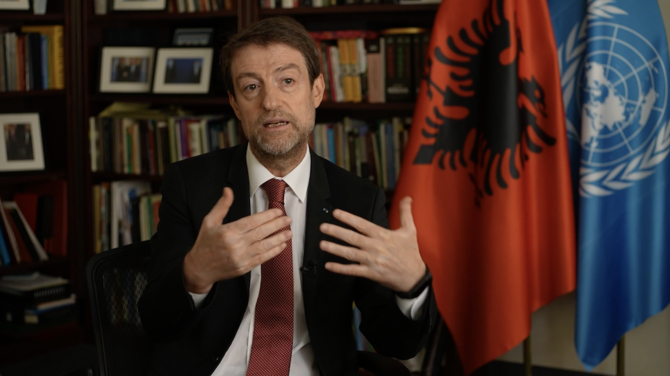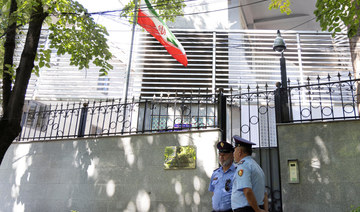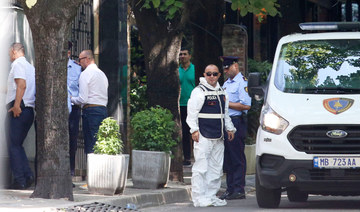NEW YORK CITY: There are few forms of human suffering in the world today that the Balkan country of Albania had not known along its tortured path through the 20th century.
It experienced North Korea-style isolation when the repressive Stalinist dictatorship that ruled it from 1945 to 1985 cut the country off from outside information and influences, on top of Albania’s drawback of being a historically obscure and inaccessible country.
Absolute leader Enver Hoxha cut ties not only with the West, but also with the former Yugoslavia, the Soviet Union itself, and eventually China.
Under his 41-year rule, Albanians had known what contemporary Syrians know all too well: The cruelty and absurdity of life under a totalitarian regime, with countless deaths and forced disappearance of loved ones into prison camps, all while the rest of the country plunged into economic destitution and misery.
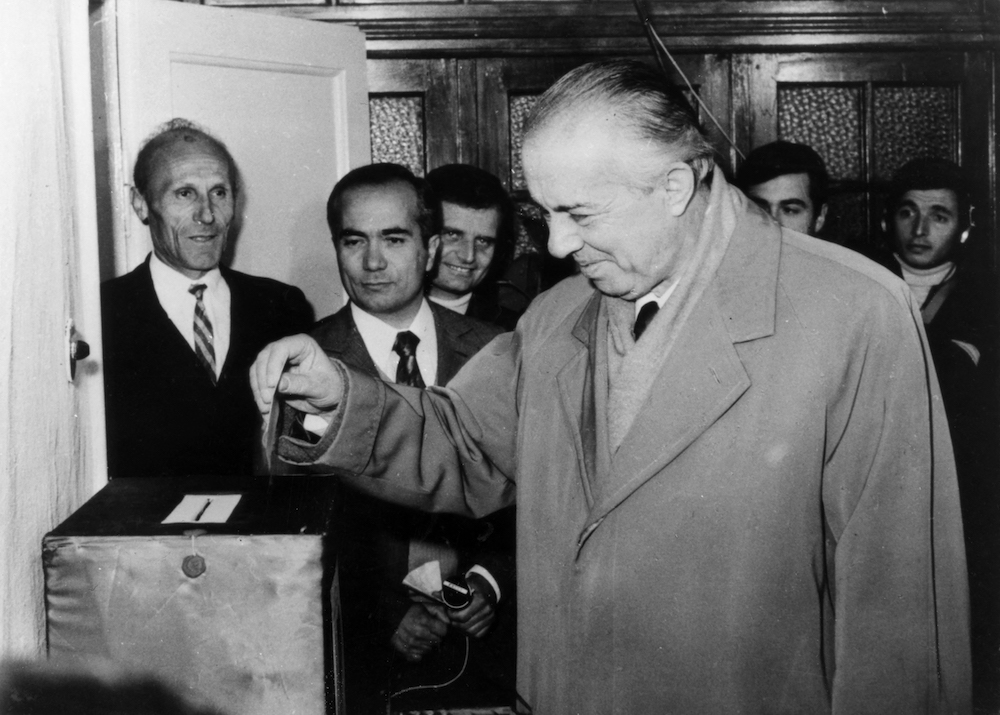
Albania's head of state Enver Hoxha votes on November 1978. ( AFP)
Similar to the Lebanese and the Yemenis of today, the people of Albania then had known only a life of queues for bread and fuel.
The big Ponzi scheme the Lebanese awoke to and have continued to reel under since 2019, has a precedent in Albania as well. In the 1990s, the country was convulsed by the dramatic rise and collapse of pyramid schemes, but in a more literal sense.
Hundreds of thousands of Albanians lost their savings. When the schemes collapsed, riots erupted across the country, the government fell, the nation descended into anarchy, and a near civil war ensued in which 2,000 Albanians were killed.
And similar to the Afghans, the Ukrainians, and the more than 200 million other migrants on the move in the world today, Albanians are familiar with the pain of exile and displacement. During the civil war, they fled the country en masse. Many Albanians trying to escape were shot. Again, in the late 1990s, hundreds of thousands of ethnic Albanians fled Kosovo to escape marauding Serbian forces.
But then came the rupture. In December 1990, just over a year after the Berlin wall was torn down, the communist government of Albania fell, ushering in the end of history after which Albania could follow only one path: Toward capitalism, democracy, and freedom.
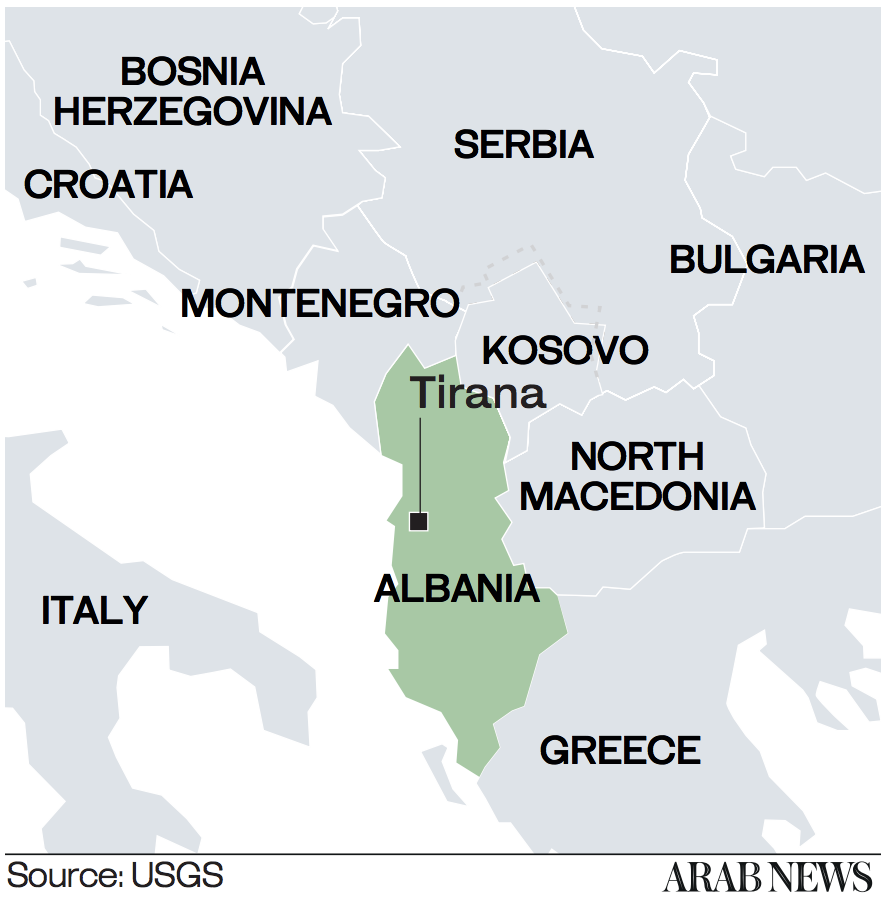
Ferit Hoxha, Albania’s permanent representative to the UN, clearly remembers a world that was violently split asunder into two: Before and after authoritarian communism.
He told Arab News: “I grew up in a country where you have one newspaper, one voice, one line, and you are not allowed to think. I was told by my parents to think twice about what I said and to whom I said it.”
Freedom, he said, begins “when you put in doubt what you hear. Freedom does not mean that you can do everything you want. No. Freedom is built through institutions, laws, rules, accountability, justice.”
The search for freedom has a deep resonance in a country such as Albania, the chronicle of whose political history, according to Hoxha, has a recurrent theme: Domination.
“Through centuries, Albanians have fought to really find their place, their rights, and to define their future. They have not always had the chance,” he added. And he noted that Albanians had always resisted through “language, culture, identity.”
He recalled a time when his country was a pariah in the world. “And of course, when you are a small country and not an important one as we were at the time, you just get forgotten. You may think of yourself as the center of the world, but in reality, you are forgotten.”
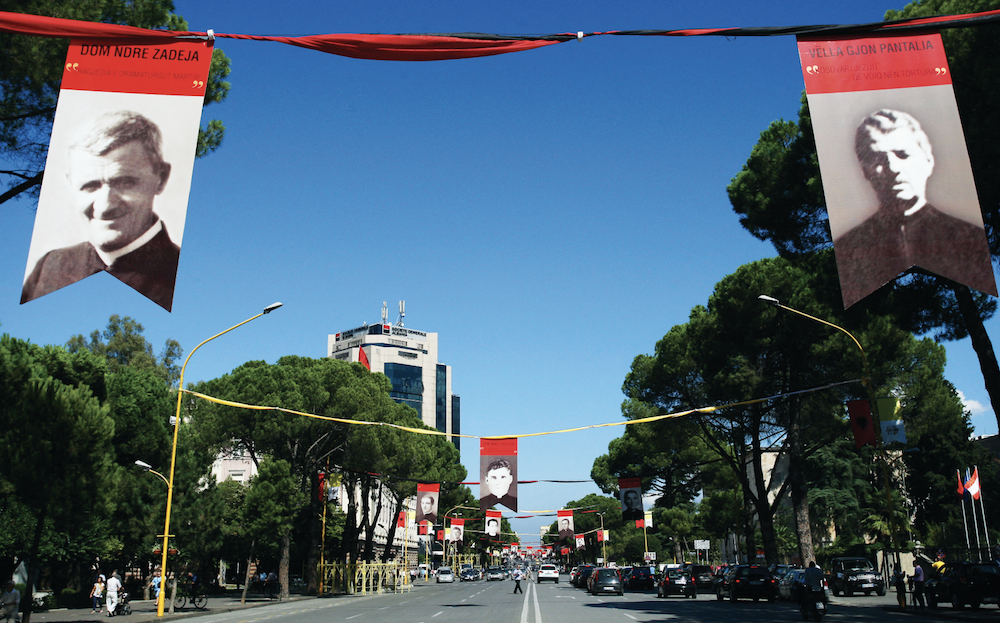
Images of Roman Catholic clerics killed or persecuted in Albania, ahead of a visit Pope Francis in 2014. Under communism, Albania banned all religion and sought to suppress faith leaders for decades. (AFP)
Thirty years later Albania is anything but forgotten. As the world experiences unprecedented upheaval, with woes ranging from the coronavirus pandemic and war in Ukraine to the drought and imminent famine in Somalia, Albania has been one of the loudest voices championing the underdogs from its seat in the UN Security Council.
Member countries, who often campaign for a seat for years, have a say in peacekeeping missions and the council’s other approaches to conflict hotspots, plus a strong voice on issues of international peace and security.
What in the past 30 years transformed Albania from a pariah state to a vocal advocate of universal values on the international stage? What happened along the way?
Hoxha said: “What happened was transformation. The progress and change seen (in the early 1990s) were like nothing else Albania has known for the past 2,500 years. So sweeping was the change, so strong was the desire, and so profound was the transformation.”
He is aware that Albania’s painful past will sound familiar to people in many countries even in these post-modern times.
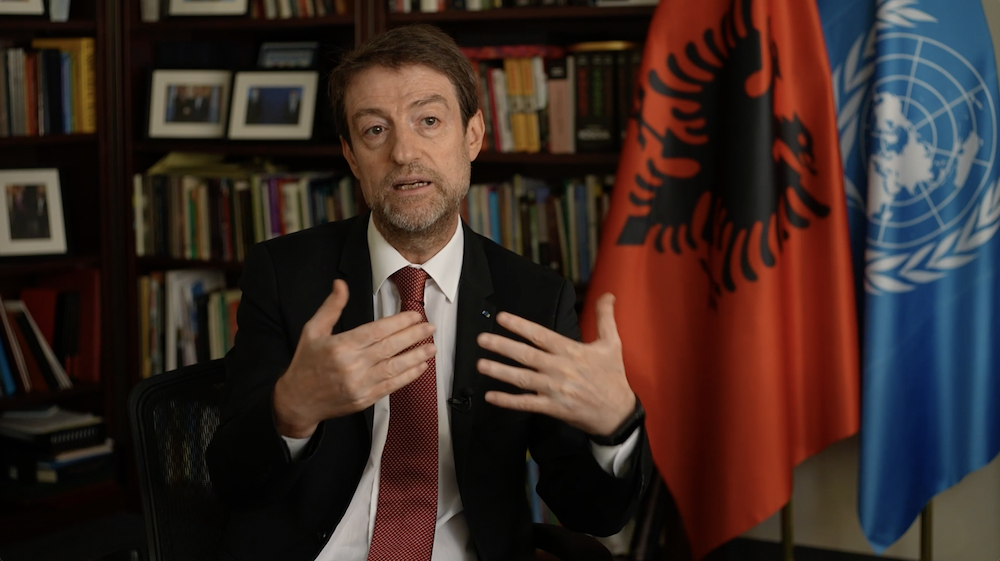
Albania’s Permanent UN Representative Ferit Hoxha during an interview with Arab News at the UN General Assembly. (AN Photo)
His impassioned speeches at the Security Council carry within them the conviction of lived experience. When he enshrines the UN Charter and universal principles in his statements, they take on a renewed meaning. His words in the chamber have the ring of truth and clarity.
During a recent Security Council meeting on Syria, for instance, Hoxha began by saying that there was no other place in the world where the expression “no end in sight” applies to than Syria.
He pointed out that after 11 years of violence and “everything in the book of crimes committed by many but especially by that regime that started it all,” the solution in Syria now hinged crucially on the political process, “and I don’t think there will be a meaningful political process without accountability.”
Hoxha added: “If I were a senior citizen (in Syria) today, despite how much I might have suffered, despite how many members of my family might have died or are missing among those 130,000 people who are unaccounted for, and despite many members of my family being in the notorious prisons of the regime, I will ask one question: Can I build my future with the same people? Can I build my future with the same domination of one part of the country over everything else?
“If the answer is yes, then we are going to see the next chapter of the war begin.
“Because there is one thing that we have learned from Albania’s thousands of years of domination: That at the end of the day, whatever we do, people want freedom, peace, and prosperity. Deep down you have that boiling desire to really live a dignified life. And there is no human being on Earth that would like to live without a minimum of dignity.
“That’s why for me, without accountability, Syria will not see an end.”
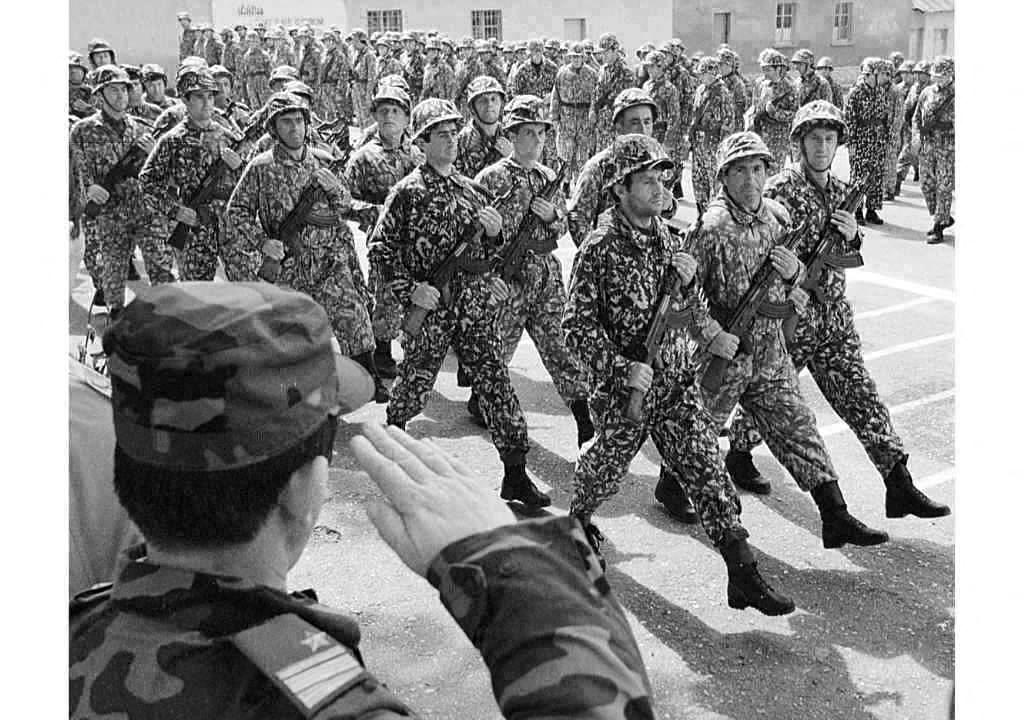
An officer salutes members of Albania's sole military academy train 30 kilometers from Tirana, preparing themselves to work with the international force to be deployed in the country. (AFP/File Photo)
From Palestine to Yemen, Libya and Lebanon, there was a common thread, according to Hoxha, and that was “instability.” Although each situation was unique, Hoxha laid the blame for instability at the feet of the political classes who had failed to come together or move on from their own narrow interests to those of their people and country.
“That’s one big weakness of the political class. When the political class is not really able to come together, then you have weak institutions which do not permit the country to really move forward.
“So, there is one big test of maturity for many countries to acquire: Do we want to build things for all of us, or just for some of us?”
That, he said, was the case in Yemen, for example, where a “big drive” of investment in a process initiated by the Yemeni political class would provide a buffer against and significantly weaken the many external influences of self-seeking countries that were bearing upon the Yemenis.
“That’s why now we are so eager to support the truce, extend it, and resolve the remaining issues, such as the closure of roads in and out of Taiz, the Houthis’ lack of cooperation, and so on.
“The objective is to get the necessary attention and support by the council. The support of the Security Council is crucial because it is that kind of positive tsunami you cannot go against,” Hoxha added.
There is one thing that we have learned from Albania’s thousands of years of domination: That at the end of the day, whatever we do, people want freedom, peace, and prosperity.
Ferit Hoxha, Albania’s permanent representative to UN
In Libya, the problem was legitimacy, according to Hoxha.
“Today, we have two governments in Libya, two parallel settings, and nothing good can come out of that until some legitimacy is restored.
“Everywhere we have seen seizure of power by force or by other means, or by proxies, that hasn’t lasted. It may have lasted for a certain time, but it failed to win the hearts and the minds of the people.”
Just like Albania had friends that stood by its people as they scrambled to find their bearings in a new world after years of isolation, Hoxha believes the Middle East can benefit from the “positive energy” that Saudi Arabia and other Gulf countries can radiate into an otherwise miserable region.
Hoxha pointed out that their role was nowhere else as needed as it was in the Palestinian-Israeli conflict.
He described Saudi Arabia and the rest of the Gulf countries as important players who were becoming more active.
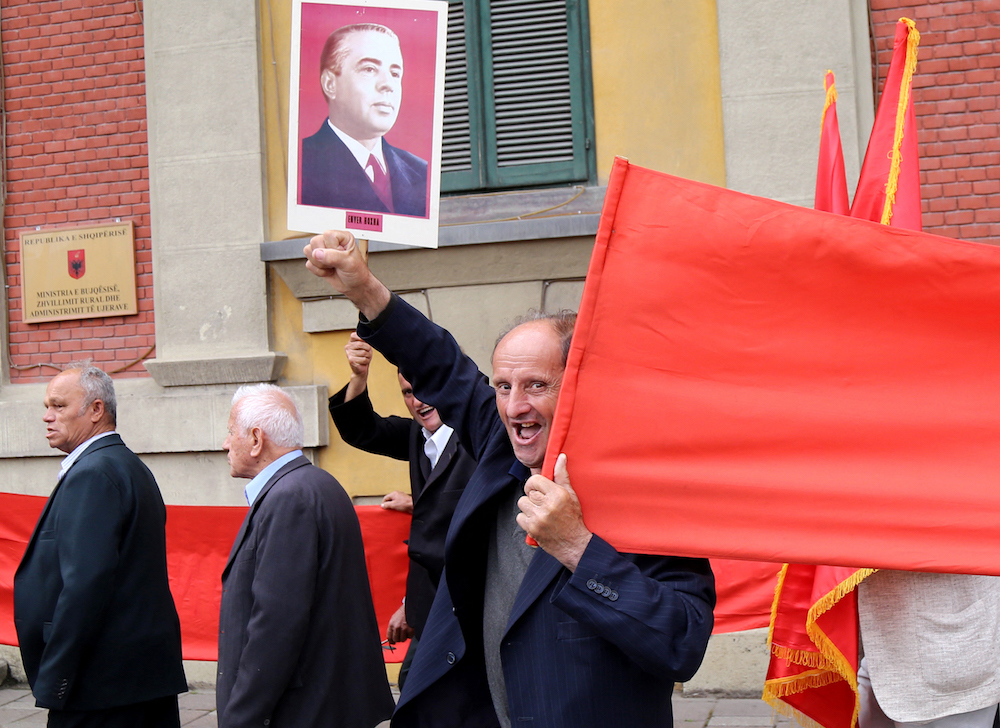
A handful of Albanian communists shout slogans holding a portrait of late Albanian communist dictator Enver Hoxha during a May Day march in Tirana on May 1, 2016. (AFP)
“They can be extremely helpful in advancing not only the cause of women, peace and security, and advancing rights everywhere, but also, more than anything else, they can help to infuse the countries of the wider Middle East with positive energy, to enable them to get out of the rut in which they have been stuck for the past 70 years or more.”
Hoxha said the power of Gulf countries was “immense,” their influence was growing, and their ability was there, but that they needed to act in a more coordinated way.
“Because they are important per se, but they also have friends and relations with other powers. And I hope this is used not only bilaterally, but regionally and globally to really push for peace and a solution for the Middle East.
“We are asking for a bigger, more coordinated role with other actors in making sure that we have a process that would really help everyone to move forward in the most complex and the most tragic conflict that we have known since the Second World War, which is the Israeli-Palestinian conflict,” he added.



